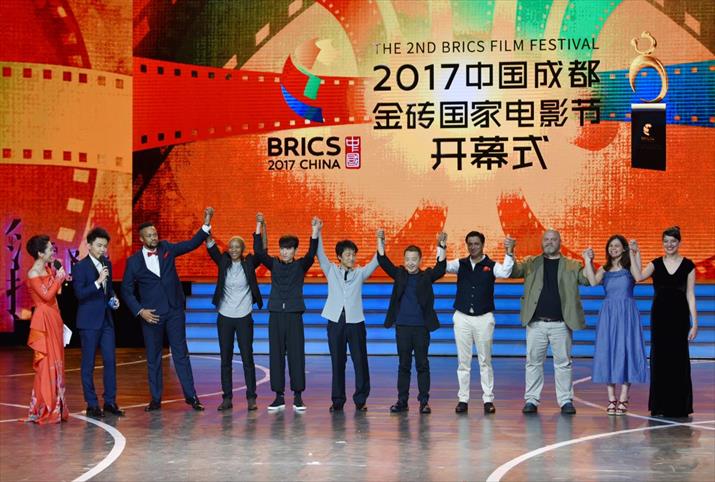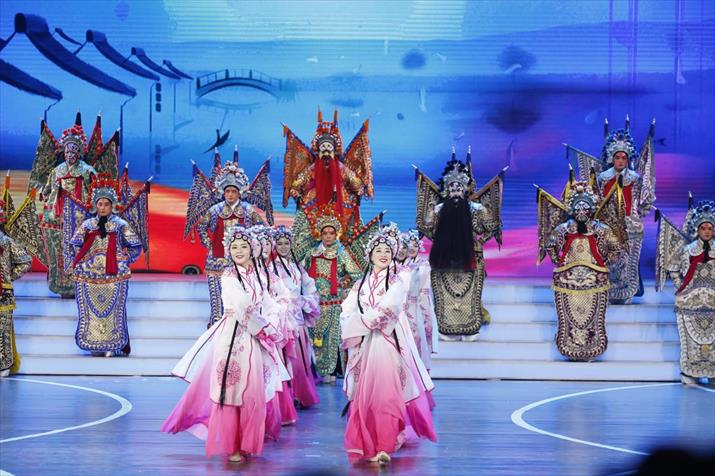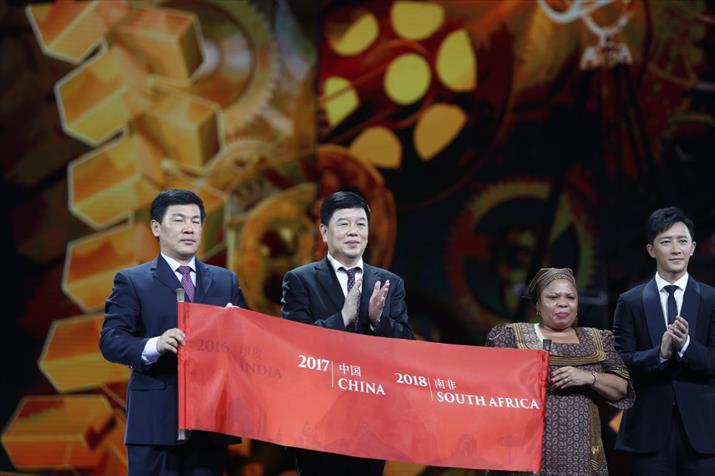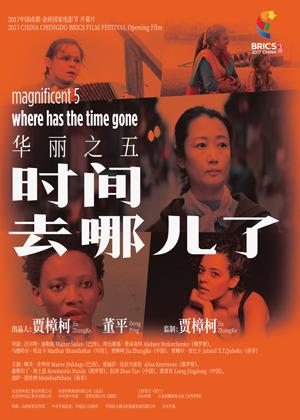|
||||||||||
| Home Nation World Business Opinion Lifestyle ChinAfrica Multimedia Columnists Documents Special Reports |
|
||||||||||
| Home Nation World Business Opinion Lifestyle ChinAfrica Multimedia Columnists Documents Special Reports |
| Current Cover Story |
| BRICSBUSTER! |
| Film cooperation among major emerging economies is keeping it reel |
| By Sudeshna Sarkar and Xia Yuanyuan | VOL. 9 August 2017 ·2017-07-31 |

The films that Jahmil Qubeka made were all in his head. As a black South African growing up in apartheid South Africa, he saw a country carved up into "mini countries" by the administration, "homeland states" where people were confined according to the color of their skin. He lived in the Republic of Ciskei, a designated homeland for Xhosa-speaking people, and in the 1980s, all residents of Ciskei had their South African citizenship revoked.
"I needed a passport to enter my own country," the 38-year-old said, shaking his head in disbelief. "It wasn't South Africa! So films were my way of escape. I began to watch films ravenously, and then I began to make my own films in my head."
Power of images
One of the earliest celluloid stories to leave a lasting impression on his mind was Man With a Movie Camera, a silent documentary by pioneering Soviet filmmaker Dziga Vertov. "The fact that a 1929 film could touch a young man decades later tells you about the power of movies," Qubeka said. "It made me decide that I would become a filmmaker one day."
Now with three feature films under his belt, that day has arrived. Also, after the first non-racial democratic elections in 1994, South Africa has undergone a sea of change. "We have political problems and administrative challenges, but South Africa is a free country," Qubeka said. "We can go wherever we want. It's our birthright!"
There were many more things to celebrate when the South African delegation of film directors, actors, officials and other personnel from the entertainment industry arrived in Chengdu, a city with thousands of years of history but state-of-the-art infrastructure in Sichuan Province, southwest China, to attend the Second BRICS Film Festival in June.

"We are the youngest nation in BRICS and so our world view is very small," Qubeka, who was part of the delegation, said. "We have no idea of our place in the world. BRICS gives us a place at the table."
Though BRICS became a five-member bloc with South Africa joining the quartet of Brazil, Russia, India and China in 2010, and though there has been a series of annual summits of BRICS leaders to plan greater development for the group, it was felt that more could be done to improve cultural cooperation and people-to-people exchanges.
So at the Seventh BRICS Summit in Ufa, Russia in 2015, Indian Prime Minister Narendra Modi suggested that the member countries organize popular events like an annual football tournament for young people under 15 and a BRICS Film Festival to share cooperation, cultures and stories. Subsequently, the First BRICS Film Festival was held in New Delhi, India, last year, followed by the Chengdu film festival, which was a run-up to the Ninth BRICS Summit that will be held in September in Xiamen in southeast China's Fujian Province.
"This forum is most valuable because it has an economic aspect, a policy aspect and people-to-people connections," said Marcos Caramuru de Paiva, Brazilian Ambassador to China, who led the Brazilian delegation to the Chengdu film festival. "It creates the design of future cooperation."
One cooperation has already borne fruit: It is the first BRICS coproduction, Where Has the Time Gone, a 110-minute anthology of five short films made by five filmmakers from the five countries on the theme of time, which premiered at the Chengdu film festival.
"We share social similarities and profound civilizations, but we have different ways of dealing with challenges in a world where lives are changing so fast. The five short films represent five diverse cultures." This was how Jia Zhangke, one of the most recognized modern Chinese directors and coordinator of the cooperation film, introduced the project to the audience.
The idea of a BRICS collaborative film came from Chinese President Xi Jinping at last year's summit. It was a hectic eight months for Jia once he was chosen as the coordinator and film director from China. Modern communication technology was a great help to choose the other directors - Qubeka, Russian director Aleksey Fedorchenko, India's Madhur Bhandarkar and Brazilian Walter Moreira Salles, discuss the scripts with them, and shoot the films.
Where Has the Time Gone will also be screened at the Xiamen BRICS Summit with other public screenings in China expected at the same time. Jia said negotiations are on with film agencies for further shows at film festivals as well as international distribution. It has also been decided that there will be five BRICS co-production films from 2017 to 2022. Veteran Chinese film producer Han Sanping, former chief of China Film Group Corp., pointed out how BRICS films could benefit from China's resources. "China has the largest market and a lot of resources," he said. "For any film [screened in China] you have tens of thousands of viewers."
Statistics show that in 2016, China's box-office revenue was 49.28 billion yuan ($7.4 billion). By May 2017, there were over 45,000 screens nationwide, an exponential jump from the modest 1,845 in 2002. Today, the Chinese film industry boasts nearly 2,000 investors with over 500 venture capital firms.

Qubeka said the announcement about the scholarships was music to his ears. "We are such a small country, only 56 million people, and we are also new to the game," he said. "We will grow and be stronger for it."
Though with a very young industry struggling with a Hollywood stranglehold and making a limited number of domestic films annually, in 2016, South Africa made 28 feature films, including 11 coproductions - the South African film industry's remarkable achievement is the emergence of black directors and artists and telling South African stories from the South African perspective.
"During apartheid, the options were limited; but the last 15 years have seen a large number of South African stories coming to the fore with feature films by independent filmmakers," Charles Mabaso, Chief Director for Cultural Development at South Africa's Department of Art and Culture, said. "We support films on the history and heritage of South Africa, on unsung heroes and heroines, and South Africa's relations with the rest of the world."
An example of that is South African director Mandla Dube's 2016 film Kalushi, the biopic of Solomon Mahlangu, whose transformation from a hawker to an anti-apartheid icon hanged by the state created a stir at the First BRICS Film Festival.
"It's the kind of story we don't want to lose," Mabaso said. "Our young people's consciousness will not grow if we forget such stories. We are still dominated by American films but now that we have the necessary infrastructure; hopefully we will go forward."
Righting a wrong
Though South African producer-director Xoliswa Sithole, a BAFTA and Peabody awards winner, grew up in what was then Rhodesia, today's Zimbabwe, the childhood environment she remembers was as restrictive as apartheid South Africa's. "I never saw a single black face on TV," said the 50-year-old, who was a member of the jury at the Chengdu film festival. "The only time we met white kids was in school."
Sithole, who returned to South Africa following Nelson Mandela's release from prison in 1990, thinks BRICS, which accounts for 40 percent of the global population and over 20 percent of the global GDP, is an opportunity for the five developing countries to shift the dynamics in global consciousness.
Sithole also thinks BRICS filmmakers have a responsibility to make cinema and art accessible to ordinary people. "Take art out of the preserve of the elite. In South Africa, for instance, it was white male territory for so long. The mandate of art is to educate and uplift people."
As part of addressing the global imbalance and injustice, BRICS filmmakers are thinking of working outside their communities to give a voice to the marginalized. Her first China visit has awakened Brazilian producer Claudia Da Natividade, who together with her director husband Marcos Jorge founded Zencrane Films, a Sao Paolo-based production house with 50 awards under its belt, to the plight of Brazilians of Chinese descent.

"We have Chinese immigrants in Brazil, especially in Sao Paolo," she said. "While one kind is rich and powerful, the other is very poor, subsisting on selling Chinese goods and labor. Though they also contribute to the economy, Brazilians don't connect with them. BRICS films would be a great opportunity to give visibility to such people who are invisible."
Jorge, who won 16 international awards with his debut film Estomago (Stomach), which he says is about power, sex and food, is optimistic that the BRICS filmmaking community would be able to effect a change. "The next step is to make universal movies focusing on the common themes of humanity," the 52-year-old said. "We have ample potential to make a difference in the contemporary world with our economy, culture and vitality."
Discovering South Africa
Africa holds six documentary film festivals annually and its Durban International Film Festival is one of the biggest on the continent. It has also started hosting a BRICS-focused film festival, the RapidLion Film Festival, in Johannesburg.
"South Africa has breathtaking locations, studios and talent," Mabaso said. "We want people to shoot films here. It's also cheap."
Nine provinces in South Africa have their own production facilities and Hollywood and other foreign companies have been taking advantage of that, making films in South Africa like The Avengers: Age of Ultron, Safehouse and District 9.
Mabaso said films are also a tool to boost tourism. "As soon as you see a beautiful location in a film, you want to visit it."But perhaps the best gain from the Second BRICS Film Festivals is bringing together people from different corners of the world and creating a bond of amity among them through five days of talking, eating and watching films together.
Zhang Pimin, Vice President of China Alliance of Radio, Film and Television, put it into words with touching simplicity when the baton of the BRICS Film Festival was handed over to South Africa which, as the next BRICS chair, will host the event in 2018.
"We are thousands of miles away and have different colors and cultures. But we are united under BRICS," Zhang said. "Next year, the film festival will be held in South Africa. And we will continue our story of friendship."

| About Us | Contact Us | Advertise with Us | Subscribe |
| Copyright Beijing Review All rights reserved 京ICP备08005356号-5 京公网安备110102005860号 |